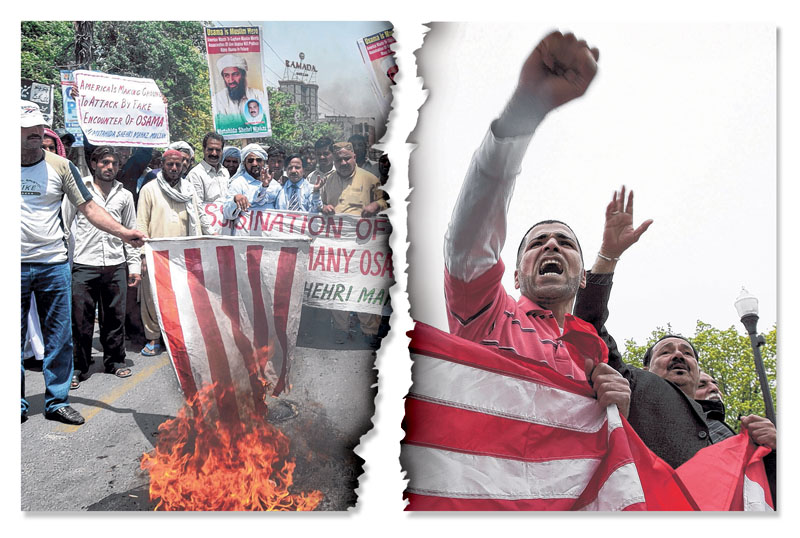WASHINGTON – Osama bin Laden is dead, long live the American-Pakistani alliance! Mine may not be the flavor-of-the-week opinion in liberal circles, let alone among those Republicans and Democrats looking to Fortress America as the only reliable shelter for a nation straining under the load of its hegemony.
The depth of hurt and memory of what bin Laden did to America nine years and nearly five months ago erupted as joy in spontaneous crowds forming late Sunday night around the White House.
The shouts celebrating bin Laden’s death at the hands of U.S. Navy SEALs told the world that America’s memory is as long as its punishing arm.
To have discovered that bin Laden hid in plain sight on the periphery of a Pakistani army installation only 100 miles distant from Islamabad, the country’s capital, confirmed long-held suspicions of Pakistan’s reliability as an ally. For proof look no further than the blogosphere.
Why then do I say long live the alliance? Why do I use the word “alliance” in the first place?
I present my reasoning as clearly and concisely as I can. America — and the western world — must have Pakistan’s help to prevent the hideously worse.
Is it an alliance of necessity? Yes, of course it is. Does Pakistan need it as badly? Yes, it does. It may be an unloving union, but each side knows it will fare worse without the other.
I would argue that Pakistan is a steady partner when it counts. It stood by the United States when India, America’s current darling, danced body-rubbing close with the Soviet Union — to America’s detriment.
Pakistan made it possible for the United States to reap the benefit of the Soviet Union’s defeat in Afghanistan. The Mujahedeen — more armed poppy growers than religious zealots — fought, died and defeated America’s rival superpower in a key strategic part of the world.
They were helped by the CIA with guns and sidewinder hand-held antiaircraft rockets and military intelligence. They lobbied in Washington and showed up repeatedly at news bureaus in the National Press Building.
But no sooner had they won, when President Bush the elder and national security adviser Brent Scowcroft washed their hands of Afghanistan. They left the war-devastated country to its own wits, without so much as a gesture of thank you and, figuratively, a dime of help.
For Pakistan, Bush and Scowcroft went one better: they cut support funds and embargoed fighter planes Pakistan had bought and paid for. The F-16’s were stopped on the production line or parked in the United States. The money, too, landed in escrow accounts.
Alliances created on an as-needed basis make perfectly good sense to politicians and publics of the hardball school. They are cheap and offer full freedom to cut and run without nasty consequences. They look great on paper but not so great when danger is self-evident and nobody knows who can depend on whom.
Dangers lurking in the Pakistan-Iran-Afghanistan swath of Asia threaten the United States severely right now and can only grow nastier if Pakistan is cut loose, as happened three decades ago.
I don’t know whether Pakistan’s military and security service kept bin Laden hidden in plain sight while telling Washington they had not a clue where he might be. But they also kept Pakistan’s nuclear weapons out of al-Qaida’s hands and that is vastly more important than the lie about the seemingly neutered bin Laden.
The question is what to do next. The smart thing, I would argue, is to acknowledge Pakistan’s effective part in the war on terror and to confirm and strengthen this useful alliance of necessity.
Bogdan Kipling is a Canadian columnist in Washington. Readers may write to him in care of the National Press Club, 13th Floor, 529 14th St. NW, Washington, D.C. 20045, or email him at kipling.newsverizon.net.
Send questions/comments to the editors.



Success. Please wait for the page to reload. If the page does not reload within 5 seconds, please refresh the page.
Enter your email and password to access comments.
Hi, to comment on stories you must . This profile is in addition to your subscription and website login.
Already have a commenting profile? .
Invalid username/password.
Please check your email to confirm and complete your registration.
Only subscribers are eligible to post comments. Please subscribe or login first for digital access. Here’s why.
Use the form below to reset your password. When you've submitted your account email, we will send an email with a reset code.